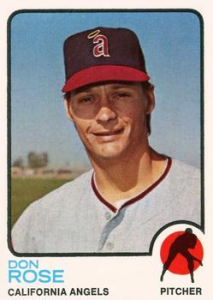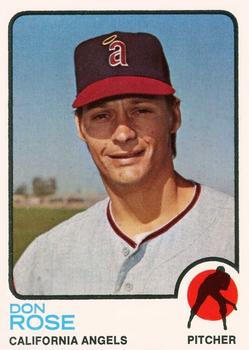May 24, 1972: Angels’ Don Rose homers in first at-bat and earns his only career win
 Don Rose always seemed to keep good company. The right-handed pitcher was the first selection of the New York Mets in the 11th round of the June 1968 amateur draft, and was followed later in that round by Chris Speier, Milt May, Al Bumbry, and Ben Oglivie. Yet while those four future solid major leaguers appeared in at least 1,100 games each in the big leagues, Rose played in a grand total of 19 contests.
Don Rose always seemed to keep good company. The right-handed pitcher was the first selection of the New York Mets in the 11th round of the June 1968 amateur draft, and was followed later in that round by Chris Speier, Milt May, Al Bumbry, and Ben Oglivie. Yet while those four future solid major leaguers appeared in at least 1,100 games each in the big leagues, Rose played in a grand total of 19 contests.
Donald Gary Rose was born in Covina, California, in 1947 and played baseball at Stanford University under coach Ray Young. After a successful three-year college career, Rose was the 229th pick in the 1968 draft, the same year the Mets used their number-one pick to select shortstop Tim Foli. The Mets also took pitcher Burt Hooton in the fifth round and first baseman John Milner in the 14th round.
After being drafted by the Mets, Rose spent four years playing in their farm system at Memphis, Visalia, Tidewater, and the Florida Instructional League before he got “the call” to the majors in September 1971. He pitched in one game after his call-up, giving up a single and a double in two scoreless frames against the Chicago Cubs on September 15 at Shea Stadium in New York.
At the major-league Winter Meetings after the season, Rose was mentioned in trade talks involving star San Diego first baseman Nate Colbert.1 Soon after the meetings, Rose was traded along with Frank Estrada, Leroy Stanton, and Nolan Ryan to the California Angels for Jim Fregosi.2
Rose started the 1972 season at Triple-A Salt Lake City but was called up to the Angels on May 18 when starting pitchers Andy Messersmith (finger), Clyde Wright (shoulder), and Ryan (inconsistency) were sidelined with injury or were simply struggling. Rose was 4-0 and had an ERA of 2.85 for the Pacific Coast League team prior to his call-up.3
The 6-foot-3 right-hander made cameos in three straight games for the Angels, tossing four perfect innings while striking out a pair. Then on May 24 he took the ball as the starter against Oakland.
The beginning of the season had been a struggle for the Angels, and on the morning of the 24th they had a record of 11-21, 10 games behind the AL West-leading Chicago White Sox. The Angels had won back-to-back games only twice in the first six weeks of the ’72 season, which started 10 days because of a players strike during spring training.
On that Wednesday evening, May 24, a small crowd of 3,042 fans saw an exciting game at Oakland-Alameda County Stadium featuring the scuffling Angels against the eventual World Series champion Oakland A’s. The weather was fair in the Bay Area, with a game-time temperature in the high 60s.
Sandy Alomar led off the game for the Angels with a base hit to center but was caught stealing two batters later and the Angels went scoreless. In the home half of the first, Rose was greeted rudely, the first two batters reaching base. Bert Campaneris was safe on an infield single to third, and Joe Rudi beat out a bunt toward the mound. Rose got out of the inning by striking out Reggie Jackson and Sal Bando, then induced a fly ball to center field by Mike Epstein to finish a scoreless first.
The contest was still scoreless when Rose came to the plate in the top of the third inning. With one out and nobody on, Oakland pitcher Diego Segui’s first pitch was slammed to left field and landed deep in the seats for a 1-0 Angels lead. “I used to be a hitter,” Rose said after the game. “But I guess everyone was in high school.”4
The Angels added two more runs on a single, an intentional walk, a double steal on which Alomar scored on an errant throw to second, and Bob Oliver’s singled to right, scoring Vada Pinson, who had been on the backside of the steal attempt. Rose walked to the mound with his head held high in the bottom of the third, leading 3-0. His confidence continued as he got Rudi, Jackson, and Bando out on two groundouts and a popup to first base. An inning later, Rose struck out the side after Epstein’s single.
California added to its score in the top of the fifth on an RBI single by Ken McMullen, giving the Angels a 4-0 lead. In his first four innings of work, Rose allowed three hits and one walk while striking out six. But his good outing would turn ugly in the bottom half of the fifth. George Hendrick pinch-hit for Joe Horlen and rapped a single to center. He scored two batters later on a home run to right by Rudi, making the score 4-2, Angels. With two outs, Bando walked and Epstein followed with a homer to deep right, tying the contest at 4-4.
Contract holdout Vida Blue made his 1972 debut for the Athletics as he took the mound for the top of the sixth, but the bottom dropped out like a good sinkerball, as two walks, a wild pitch, and singles by Ken Berry and Pinson scored two Angels runs, giving them a 6-4 lead.
Dave Duncan hit a leadoff homer off Rose in the bottom of the sixth, cutting the Angels’ lead to 6-5. Rose then retired the next three batters to end the inning. He headed for the showers having pitched six innings, allowing seven hits and five earned runs, walked two, and struck out seven. Steve Barber pitched the final three innings to earn the save for the Angels, although he made it interesting as he struck out Epstein with the bases loaded in the ninth to end the game. Rose took what would turn out to be his only victory in the majors, while Blue was the loser.
“I dreamed last night that I would hit a homer and pitch a shutout in my first start in the big leagues,” Rose said with a laugh after the game. “I didn’t get my shutout but I’m happy nevertheless.”5
Rose made 12 more appearances – including three starts – in 1972. He finished the campaign with a record of 1-4. He pitched for Triple-A Salt Lake City to begin the 1973 season but was traded in early July with infielder Bruce Christensen to the San Francisco Giants for Ed Figueroa. Rose finished out the season with Triple-A Phoenix.
Rose made San Francisco’s Opening Day roster thanks to an injury to starter Ron Bryant. The southpaw Bryant was shelved due to a gash in his right side suffered in a swimming pool accident in mid-March.6 But it still took two weeks for Rose to get into a game. He allowed one hit in an inning of work against Los Angeles on April 20, but three days later failed to get an out in a four-batter appearance, allowing three hits, a walk, and one run in an 8-4 loss to the Montreal Expos. That was Rose’s last major-league game. On May 11 he was optioned to Phoenix as infielder Ed Goodson returned from the disabled list.
Rose returned to Triple-A Phoenix in 1975 and limped to a record of 7-16 with an ERA of 6.30. He retired after the season, went back to Stanford, and earned a degree in political science. He worked as a consultant, a senior operations manager, and in logistics positions for Hitachi Limited, Novell, and ATI. He retired from his business career in 2005.
Sources
In addition to the sources cited in the Notes, the author consulted Baseball-Reference.com and Retrosheet.org.
Photo credit: Trading Card Database.
Notes
1 Dick Young, “Young Ideas: Hot Stove Confidential,” New York Daily News, December 2, 1971: 131.
2 Joe Trimble, “Big Deal! Mets Trade 4 for Fregosi,” New York Daily News, December 11, 1971: 28.
3 “Angels Call Up Don Rose,” Palo Alto (California) Times, May 19, 1972: 30.
4 “Blue Doesn’t Like the View From Bullpen,” Shreveport (Louisiana) Journal, May 25, 1972: D1.
5 “Vida Pitches but Can’t Hold Out,” Anaheim (California) Bulletin, May 25, 1972: C1.
6 “Ron Bryant Hurt in Swim Pool Accident,” Santa Rosa (California) Press Democrat, March 17, 1974: 1C.
Additional Stats
California Angels 6
Oakland Athletics 5
Oakland-Alameda County Stadium
Oakland, CA
Box Score + PBP:
Corrections? Additions?
If you can help us improve this game story, contact us.


